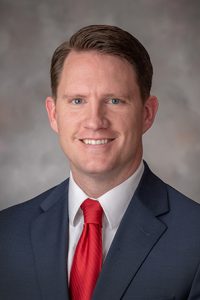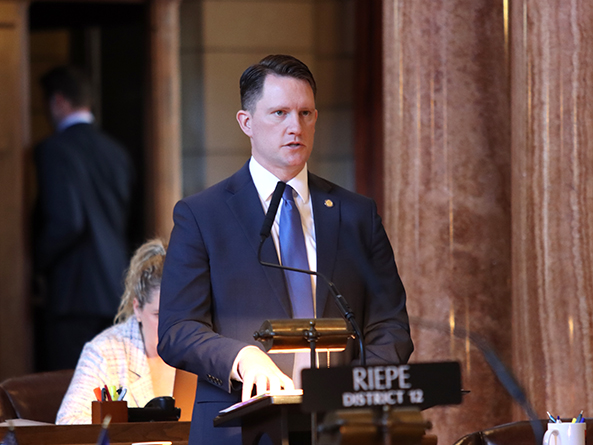Medicaid reimbursement bill expanded, advanced
A bill intended to cover a Medicaid reimbursement gap in Nebraska was amended to become an omnibus health services measure and advanced from general file April 17.

As introduced by Blair Sen. Ben Hansen, LB227 would require the state Department of Health and Human Services to provide Medicaid reimbursement to a hospital at 150 percent of the statewide average nursing facility per diem rate when a Medicaid enrollee:
• has been admitted as an inpatient at the hospital,
• is eligible for discharge after receiving care in such hospital,
• requires a nursing facility level of care upon discharge; and
• is unable to be transferred to a nursing facility due to a lack of available beds or requires a public guardian but one is unable to be appointed.
A Health and Human Services Committee amendment would lower the reimbursement to 100 percent. It also would remove the requirement regarding eligibility for discharge after receiving hospital care and replace it with a requirement that the individual no longer requires acute inpatient care and discharge planning.
The amendment also adds provisions of three additional bills heard by the committee:
• LB219, sponsored by Sumner Sen. Teresa Ibach, which would require DHHS to rebase inpatient interim per diem rates for critical access hospitals every two years using the most recent audited Medicare cost report;
• LB434, sponsored by North Platte Sen. Mike Jacobson, which would require long-term acute care hospitals to enroll as Medicaid providers and direct the department to adopt a state amendment or federal Medicaid waiver; and
• LB517, sponsored by Fremont Sen. Lynne Walz, which would require the department to implement a pilot program to facilitate the transfer of patients with complex health needs from eligible acute care hospitals to appropriate post-acute care settings. The amendment also states legislative intent to appropriate $1 million to carry out the pilot program.
Hansen, chairperson of the committee, said the underlying bill and the amendment would address an issue facing hospitals across the state — patients who can’t be moved from acute health care facilities to more appropriate facilities for a variety of reasons.
“This is an issue because hospitals don’t have the room or the budget to house these patients for long periods of time without reimbursement,” he said. “These difficult to transfer patients may have mental health problems, physical disabilities, alcohol and drug abuse issues or limited ability to function on their own.”
Finally, the committee amendment also added provisions of LB590, sponsored by Bellevue Sen. Rick Holdcroft. The provisions would increase the standard of need for eligible aged, blind and disabled persons from at least $60 to $75 per month for a personal needs allowance if the individual resides in an alternative living arrangement.
Holdcroft said the personal needs allowance — which can be used for items such as greeting cards, postage, toiletries and cell phone bills — has not increased since 2015. Increasing the allowance for individuals in nursing homes and long-term care and assisted living facilities would help residents maintain a level of independence and dignity, he said.
“It’s the little things that add up,” Holdcroft said. “Many families help where and when they can, but not all families have that ability.”
Hansen offered another amendment that would add provisions of nearly a dozen additional measures related to pharmacy practice and health profession licensure, including:
• LB35, introduced by Bennington Sen. Wendy DeBoer, which would extend the sunset date for transitional child care assistance under the federal Child Care Subsidy program and cash assistance to families who have not achieved economic self-sufficiency to Oct. 1, 2026;
• LB123, introduced by Omaha Sen. John Fredrickson, which would require behavior analysts to obtain a credential under the Uniform Credentialing Act and create a Board of Behavior Analysts to establish licensure standards and adopt a code of conduct;
• LB181, introduced by Hansen, which would specify that a prescription remains valid despite the prescribing practitioner’s subsequent death or retirement or the suspension or revocation of the prescribing practitioner’s credential and allow a pharmacist to use their professional judgment to fill or refill such a prescription;
• LB202, introduced by Walz, which would allow certified and trained pharmacy technicians to administer vaccines to individuals over 3 years of age if the vaccine is verified by a supervising pharmacist;
• LB402, introduced by Lincoln Sen. Beau Ballard, which would specify that the definition of a home health agency does not include a person or entity that engages only in social work practice;
• LB431, introduced by Hastings Sen. Steve Halloran, which would authorize the Nebraska State Patrol to submit health profession licensure applicants’ fingerprints to the F.B.I. for national criminal history record information checks;
• LB458, introduced by Ballard, which would allow a fill pharmacy to deliver to a patient on behalf of a dispensing pharmacy if both pharmacies are under common ownership;
• LB548, also introduced by Ballard, which would remove a requirement that a pharmacist licensure applicant obtain a grade of 75 on the pharmacy jurisprudence examination and require anyone authorized to compound to comply with the U.S. Pharmacopeia and the National Formulary;
• LB572, sponsored by Ralston Sen. Merv Riepe, which would update the Medical Nutrition Therapy Act by making terminology consistent and providing a pathway to licensure for certified nutrition specialists;
• LB611, also sponsored by Riepe, which would change drug administration requirements for a hospital, ambulatory surgical center or health care practitioner facility to allow any unused portion of certain medications be offered to a patient upon discharge if required for continuing treatment; and
• LB765, sponsored by Niobrara Sen. Barry DeKay, which would eliminate regional trauma advisory boards and replace them with regional trauma committees and make other changes to definitions.
Sen. Machaela Cavanaugh of Omaha made a successful motion to divide the amendments into eight separate components.
She and Omaha Sen. Megan Hunt then offered a series of procedural motions, none of which were adopted, to extend debate on LB227 in response to other actions taken by the Legislature this session. Neither lawmaker indicated opposition to the underlying bill or any of the proposals contained in the amendments.
After eight hours of debate over two days, Hansen offered a motion to invoke cloture, which ceases debate and forces a vote on the bill and any pending amendments. The motion was adopted 44-0 and all of the divisions of Hansen’s amendment and the committee amendment were adopted without dissenting votes.
Lawmakers then voted 45-0 to advance LB227 to the second round of debate.


